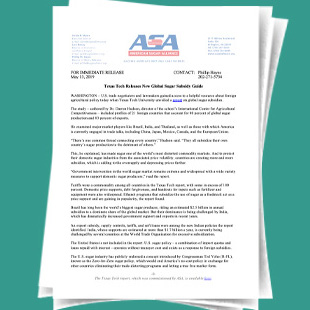Texas Tech Releases New Global Sugar Subsidy Guide
U.S. trade negotiators and lawmakers gained access to a helpful resource about foreign agricultural policy today when Texas Tech University unveiled a report on global sugar subsidies.
The study – authored by Dr. Darren Hudson, director of the school’s International Center for Agricultural Competitiveness – included profiles of 22 foreign countries that account for 80 percent of global sugar production and 83 percent of exports.
He examined major market players like Brazil, India, and Thailand, as well as those with which America is currently engaged in trade talks, including China, Japan, Mexico, Canada, and the European Union.
“There’s one common thread connecting every country,” Hudson said. “They all subsidize their own country’s sugar production to the detriment of others.”
This, he explained, has made sugar one of the world’s most distorted commodity markets. And to protect their domestic sugar industries from the associated price volatility, countries are creating more and more subsidies, which is adding to the oversupply and depressing prices further.
“Government intervention in the world sugar market remains extreme and widespread with a wide variety measures to support domestic sugar producers,” read the report.
Tariffs were a commonality among all countries in the Texas Tech report, with some in excess of 100 percent. Domestic price supports, debt forgiveness, and handouts for inputs such as fertilizer and equipment were also widespread. Ethanol programs that subsidize the use of sugar as a feedstock act as a price support and are gaining in popularity, the report found.
Brazil has long been the world’s biggest sugar producer, riding an estimated $2.5 billion in annual subsidies to a dominate share of the global market. But their dominance is being challenged by India, which has dramatically increased government support and exports in recent years.
An export subsidy, supply controls, tariffs, and soft loans were among the new Indian policies the report identified. India, whose supports are estimated at more than $1.7 billion a year, is currently being challenged by several countires at the World Trade Organization for excessive subsidization.
The United States is not included in the report. U.S. sugar policy – a combination of import quotas and loans repaid with interest – operates without taxpayer cost and exists as a response to foreign subsidies.
The U.S. sugar industry has publicly endorsed a concept introduced by Congressman Ted Yoho (R-FL), known as the Zero-for-Zero sugar policy, which would end America’s no-cost policy in exchange for other countries eliminating their trade-distorting programs and letting a true free market form.


